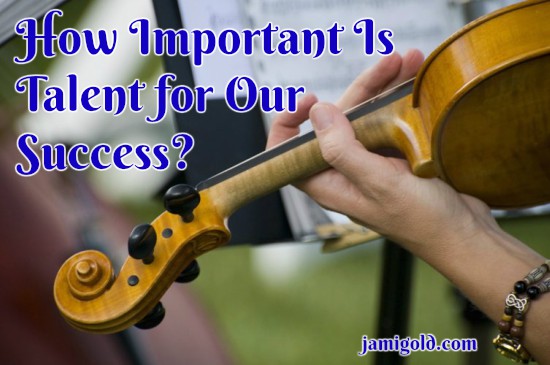How Important Is Talent? — Guest: Lizzie Shane

In any subjective situation, there’s no one right answer to succeed. What works for one person might not work for another.
That uncertainty in outcomes can lead to self-doubt when we struggle:
- Are we doing it wrong?
- Are we not good enough to succeed?
- Are we just unlucky?
When talking about artistic fields, such as writing, that uncertainty is often chalked up to talent. We might think that we either have the talent to succeed or we don’t. However, the concept of “talent” comes with problems, misunderstandings, and baggage.
Some assume that possessing talent means that everything would come easily to us. Or that we wouldn’t have to struggle to learn the basics, rules, or techniques of our field. Or that we wouldn’t have to work very hard to develop our talent.
That assumption can then lead to worrying that every struggle is just another sign of our lack of talent. And if talent is an “either you have it or you don’t” aspect of ourselves, we might think we’re doomed. After all, if we don’t have it, we’ll never be good enough—not as good as those with talent.
But that’s not how “talent” works. Sure, some rare wunderkinds seem to be naturals at such a young age that they couldn’t possibly have put as much effort into learning or developing their skills as older people in their fields, but they’re the exceptions.
Plenty of people succeed without being prodigies. Their skills weren’t automatic or instinctive. They had to struggle, learn, and develop the same way we all do.
I started thinking about this idea of “What does it mean to have talent, and are we doomed if we don’t have it?” while reading the latest story from one of my auto-buy authors, Lizzie Shane.
In Lizzie’s The Decoy Bride, Bree is a struggling artistic photographer. She’s always hoped that she was talented, but her struggles make her think that she’s just deluding herself.
“When she was creating something, life would fade away in that perfect, sharp focus of absolute purpose and a feeling would fill her like she was doing the one thing she’d been put on earth to do…
Except no one wanted her art.
How could it be her reason for existence if … she’d never had talent and was only fooling herself…?
Maybe it was time for her to grow up and learn how to live inside a schedule. Past time.”
As writers, we might be able to relate to those thoughts of self-doubt. *grin* So I asked Lizzie to join us today and share her perspective and insights on the topic: How important is talent for success?
Please welcome Lizzie Shane! *smile*
*****
What Helps Us Succeed?
Perseverance vs. Talent
by Lizzie Shane
“Genius is one percent inspiration, ninety-nine percent perspiration.”
— Thomas Edison
We’ve all heard the old Edison quote and we know that a book isn’t just a spark of an idea—it also takes hard work and execution to reach The End. But when we’re talking about success in artistic endeavors and having a successful career, it can be all too easy to look at the people who are “making it” and think that it just happened for them because they were simply that talented. And that lucky.
And yes, there is luck involved, and talent—but there’s also hard work. And perseverance.
If you ask me, luck may control the timing, but perseverance is the key to success.
What Makes Perseverance the Key to Success?
“Nothing in this world can take the place of persistence. Talent will not: nothing is more common than unsuccessful men with talent. Genius will not; unrewarded genius is almost a proverb. Education will not: the world is full of educated derelicts. Persistence and determination alone are omnipotent.”
— Calvin Coolidge
This idea, that it takes persistence as much as anything to succeed, is something I had the chance to explore in my latest release, The Decoy Bride. The heroine, Bree, is trying to make it as an artist, trying to keep heart in the face of disappointment and keep going until she becomes one of the success stories.
The difference between success and failure isn't talent—it's perseverance. Click To TweetIt was also Edison who said, “Many of life’s failures are people who did not realize how close they were to success when they gave up.” The difference between those who make it and those who don’t is often that those who make it simply keep going until they do.
They push on. They persevere. Even when they fail.
Even when a book gets a bad review. Or a marketing campaign falls flat. Or their publisher closes or they get dropped by an agent. They take what they can learn from that experience and try to come back again stronger and better than ever.
3 Steps to Help Authors Persevere
“Success is walking from failure to failure with no loss of enthusiasm.”
— Winston Churchill
3 attitudes that can help us persevere... Click To TweetIt can be hard to rally from each new setback, especially in a business that doesn’t always offer a lot of validation, but you have to keep believing in yourself and your work. That is the most important thing. Keep the faith in your books. And keep growing as an author and writing books so good the world can’t ignore them.
You never know what is going to be the thing that tips you over into being a sensation. It could be the next book you write or a book you wrote five years ago that hasn’t had its day yet.
Perseverance Attitude #1:
Take Pride in Our Efforts—Even If We Don’t Succeed
“If you really look closely, most overnight successes took a long time.”
— Steve Jobs
The trick is not to focus on some nebulous concept of “talent” as the marker for success. Studies have actually shown that children who are praised for the effort (“look how hard you studied!”) are more successful academically than those who are praised for inherent ability (“look how smart you are!”).
If we need to praise our kids for their efforts, we also need to be praising ourselves for the work we do.
Perseverance Attitude #2:
Own How Our Work Contributes to “Luck”
“I find that the harder I work, the more luck I seem to have.”
— Thomas Jefferson
I have a nasty habit of deflecting praise and attributing any success to luck, but if I’m honest with myself, I work really freaking hard. I’m always trying to do better.
And I need to remember to own that. And to celebrate it. We all do.
Perseverance Attitude #3:
Define Ourselves by Our Persistence
“Success seems to be connected with action. Successful people keep moving. They make mistakes, but they don’t quit.”
— Conrad Hilton
We will “make it” if we remember that our failures don’t define us. The vague concept of talent doesn’t define us. Our persistence does.
Perseverance: Don’t Stop Trying
“Success usually comes to those who are too busy to be looking for it.”
— Henry David Thoreau
So my best advice for authors out there hoping to make a career of this? Get busy writing and don’t let anything stop you.
*****
 Lizzie Shane is a three-time RITA-nominated author of contemporary romance. Her latest release, The Decoy Bride, is now available. Lizzie lives in Alaska and also writes paranormal romance as Vivi Andrews.
Lizzie Shane is a three-time RITA-nominated author of contemporary romance. Her latest release, The Decoy Bride, is now available. Lizzie lives in Alaska and also writes paranormal romance as Vivi Andrews.
For more about Lizzie and her books, please visit www.lizzieshane.com. You can also find her on Goodreads and Facebook.
*****
 What’s the hottest movie star in the world to do when she wants privacy for her wedding day? Pay someone else to stage a fake wedding half a world away, of course.
What’s the hottest movie star in the world to do when she wants privacy for her wedding day? Pay someone else to stage a fake wedding half a world away, of course.
Struggling artist Bree has been the great Maggie Tate’s decoy for a while now, but when the movie star asks her to impersonate her for three weeks to distract the paparazzi from her real wedding, she has no idea what she’s getting herself into. Especially when she realizes she’s going to be isolated in one of the world’s most romantic settings with the bodyguard she can’t seem to stop drooling over.
Retired football star Cross has always been driven to be the best at everything he does – whether that’s professional sports or personal protection. He doesn’t make mistakes. Ever. But when the sexy little decoy and her complete lack of impulse control start throwing him off his game, he’s about to discover that there are some things in life he can’t control. Like the irrepressible decoy… and his heart.
Now available at:
Amazon | Barnes & Noble | Apple
*****
Thank you, Lizzie! I think as writers, we can very easily fall into the trap of thinking we don’t measure up. That our struggles prove we lack enough talent or other inherent abilities. But your insights are perfect for remembering what really helps us succeed.
I loved this exchange from Lizzie’s novel The Decoy Bride:
“Do you know what the difference is between those who succeed and those who fail?”
“Talent?”
“The successful people keep going after they fail. They learn from their failure, but they never stop trying. Stupid, dogged determination. That’s what success is. Don’t give up, Bree.”
We often look for outside validation as writers, especially if we self-publish, but like many aspects of our writing career, validation isn’t something we can control. Even a lack of sales doesn’t necessarily indicate anything about the quality of our writing, as there are many variables affecting whether readers even know of our work.
Focusing on aspects we can control, such as perseverance rather than perceived “talent” (or lack thereof), is healthier for many reasons. For one, a determined commitment to persevere affects our attitude about our worth and the worth of our work.
We won’t need others to tell us we’re worthy or that our writing is worthy. We’ll know that truth already—maybe not with our current story, but we’ll get there eventually because we won’t give up. *smile*
Have you ever worried about not having enough talent? Do you agree or disagree with the idea of perseverance being more important to our eventual success than talent? Which do you think you have more of: determination or talent? Has persevering helped you in the past, and if so, how? Do you have any questions for Lizzie?
Pin It
This is a nice post. For me the message is pertinent any ol’ day. It’s always good to remember that the lack of outside validation does not mean our books are no good. It always seems I have to make a choice between writing and marketing. If I don’t market, I don’t sell. If I don’t write, I have nothing to market. Without at least some sales, I get no validation. At times it seems like the cat chasing its tail.
But when I don’t write, I lose my center. So I always have a starting point. Then the doubts start.
I like your suggestion that we should focus on perseverance instead of talent. True enough, we can do something about the former. I heartily agree our artistic endeavors suffer when we have to rely upon external validation. Also, our comfort level with what we are doing should factor in — the journey instead of the destination. (You show this in your excerpt from your book.)
I don’t stop questioning myself about what I am doing, but reading articles like this gives me ammunition to counter the self-doubts.
It is hard to quiet those doubts, but we have to focus on the things we can control – like the books we write. Happy writing! Hold onto the passion!
What a coincidence! I just wrote a blog post on different beliefs towards “talent” and outstanding achievement sometime ago, as this has always been a topic of fascination for me. Yes, I do believe wholeheartedly in perseverance, and I believe that talent is a fictional idea that people have constructed to simplify very complex phenomena. (Some people get very offended when I tell them about my latter belief, lol.) There are some things to watch out for, however, if one has a steadfast faith in perseverance and determination: 1) We might become too focused and refuse to spend time in other domains of interest as well. I do get that spreading our efforts too thin won’t get us very far in our chosen specialty (e.g. writing). But refusing to branch out even a little would be a great loss. There’s a phenomenon where we may develop tunnel vision if we are so exclusively steeped in one domain. It would be helpful for our creativity to go into at least one other domain, because different fields and disciplines can inspire each other. Knowledge from other domains can often help us understand things in our main domain, or even help us solve problems we wouldn’t have solved if we only knew about this one domain of interest. For writing in particular, I’ve heard of the advice that it would be good to become knowledgeable about at least one “content” field, since writing is more like a medium, a vehicle for content, rather… — Read More »
(Sorry, my comment was too long, so I’m posting this second comment to finish what I wanted to say:)
I will add very quickly that even for those who do believe in talent, there are diverse beliefs. For instance, believing that:
–talent is only 1% of success;
Or
–talent is 50% of success;
Or
–Another percentage that you’ve heard of
—“you either have it or you don’t”
Or
—Talent is a matter of degree. It’s about having more or less talent rather than a presence or absence of it
–you must have a bit of talent to do really well;
Or
–you must have tons of talent to become amazing at a skill;
Or
–you can still be outstanding without any talent at all, as long as you are exceptionally dedicated;
–or having a natural disadvantage (e.g. a speech impediment) may ironically make you more motivated than your peers to work hard and achieve greatness.
Yes, I know, I’m a fanatic when it comes to this topic, because it intrigues me to no end.
P.S. For anyone who is curious, this is my blog post where I discuss the consequences of having different beliefs about talent, success, and distinguished performance: https://sieranlanecom.wordpress.com/2018/08/04/139/
That is fascinating analysis, Sieran! I’m such a nerd for delving into questions about success in subjective pursuits. I completely agree that we need to develop ourselves as humans as well as writers and make sure we are living our lives outside of the literary bubble. Sometimes I can get too work focused and it definitely helps to refill the well. Speaking of which… I really need to plan some more travel! 🙂
Thanks! It’s one of my favorite topics, haha.
Yes, it would be so sad if I were to stagnate as a person, especially as this stagnation would show in my stories too. For any readers or friends who keep up with my stories, they would go, “This poor boy only improved in his craft. He hasn’t matured at all as a person. He’s still stuck in those same thinking patterns!”
So I don’t want that to happen.
(I will not mention names, but there were some famous authors I read for my English lit classes: They were brilliant artistically, but it seemed like they never managed to progress beyond a certain stage of psychological growth in their stories or poems. I’ll keep them anonymous because I don’t want to offend anyone here, lol.)
Refilling the well is a good way to put it. I want to spend more time drawing, as I do enjoy the visual arts, and it’s nice to work with images rather than just words— even though I adore words.
Thank you, I enjoyed the quotes particularly.
I think that talent in telling stories will be evident at an early age. Kids are highly creative. This does not provide a book which is well plotted, or beautifully written, or grammatically correct. So plenty of learning and working needs to to happen.
These days many of us are finding difficulty in concentrating on long writing sessions and some people are having to use tricks like 25 minutes writing with a break of 5, so clearly we are becoming distracted by the instant results we get by reading and posting online. Perseverance really is the only way through this issue. A page written a day is still a page more than existed yesterday.
Great point, Clare, about how we have started to crave instant results as a society. I get a lot of productivity out of writing sprints, but I feel like i have my most creative, outside-the-box ideas when I take a step back and give my brain the space to breathe – often by doing something else entirely, like working out or going for a drive.
[…] Lizzie Shane examines the often asked question: how important is talent? […]